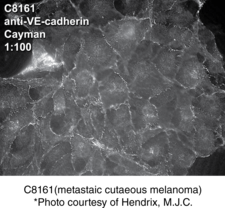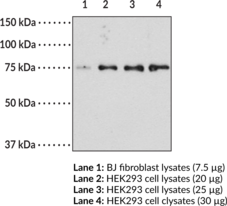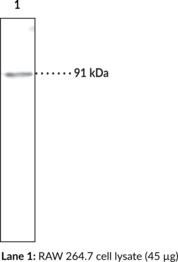Description
VE-cadherin (vascular endothelium cadherin), also known as Cadherin-5, is an endothelial cell-specific adhesion molecule localized at intracellular junctions.{7201, 7068,7071} The protein belongs to the cadherin superfamily of adhesion molecules.{7072} VE-cadherin plays a pivotal role in vascular structure assembly. Endothelial cells fail to organize in a vessel-like pattern if the VE-cadherin gene is disrupted.{7069} In this aspect, VE-cadherin is a critical component of a protein complex which controls endothelial cell tube formation.{7070} VE-cadherin is also critical for maintenance of the endothelium. Following disruption of endothelial cell monolayers with an anti-VE-cadherin antibody, endothelial cells rapidly resynthesize VE-cadherin in order to restore their intracellular junctions.{6997} Human VE-cadherin has a molecular mass of approximately 87,500 based on the deduced amino acid sequence and is 83% and 79% homologous to porcine and mouse VE-cadherin at the amino acid level. Cayman’s VE-Cadherin Polyclonal Antibody can be used for immunocytochemistry, immunohistochemistry, immmunoprecipitation, and Western blot applications. The antibody recognizes VE-Cadherin at 88 kDa from human, bovine, and mouse samples.
Synonyms: 7B4 Antigen|Cadherin-5|CD144|Vascular Endothelial Cadherin
Immunogen: Recombinant VE-Cadherin fragment (amino acids 259-434)
Formulation: 500 µl of protein A-purified IgG
Isotype:
Applications: WB, IP, and ICC
Origin: Animal/Rabbit
Stability: 365 days
Application|Immunocytochemistry||Application|Immunohistochemistry||Application|Immunoprecipitation||Application|Western Blot||Product Type|Antibodies|Polyclonal Antibodies||Research Area



